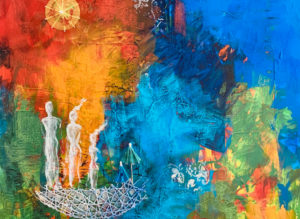Vital Organs | Carolyn Lewenberg | Be the Change Boston 2022
Published Jan 25, 2023

Vital Organs
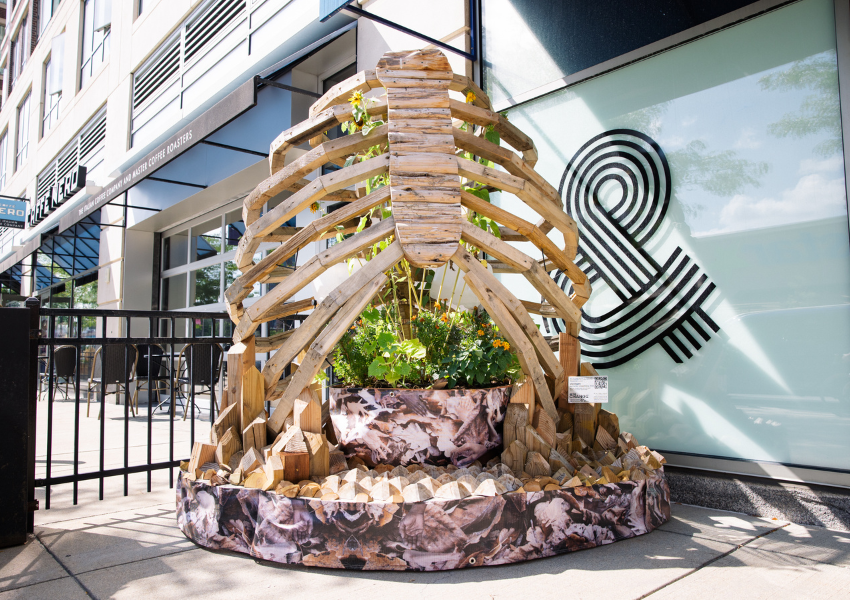
Artist Statement:
Protecting trees and plants is critical for the survival of our own and many other species, and, foundational to do this work, equity issues must also be addressed. Boston’s Tree Equity Maps show how the health of urban forest ecosystems in different neighborhoods mirrors health and income disparities, and how communities of color are disproportionately affected by lack of access to greenspaces. Vital Organs shows a human rib cage protecting plant life, on a base of handprints of different skin tones blended in with leaf litter. This piece points people towards ways they can support environmental protection and restoration work in vulnerable communities.
Created in association with the Act to Improve Outdoor and Indoor Air Quality for Communities Burdened by Transportation Pollution, Municipal Reforestry Act, and the Ordinance Establishing protections for The City of Boston Tree Canopy.
Carolyn Lewenberg is a Public Artist whose practice explores possibilities of how our species can be in right relationship with each other and the ecosystems around us. She asserts that the strength and humility of these relationships will determine our ability to adapt to changing environmental and social conditions in ways that can make our communities more resilient. She creates work in collaboration with community organizations, non-profits, municipalities, and state and national groups including the National Park Service and Department of Conservation and Recreation. She was the 2017-2018 Artist in Residence at the Metropolitan Area Planning Council. Her reflections on working with planners and municipalities on public art have been featured on ArtPlace America and National Endowment for the Arts blogs. Carolyn received a Masters in Art Teaching from Massachusetts College of Art and Design (MassArt), and BS in Landscape Architecture from UMass Amherst.
Be the Change Walking Tour Recording: Carolyn Lewenberg
(3 min) Listen to Carolyn Lewenberg describe her piece for the Be the Change Walking Tour.
Discussion: Mental Health and Environmental Justice
(1 hour 10 min) An online discussion featuring 2 of the 6 Boston-based Be the Change artists, Tran Vu and Carolyn Lewenberg, in conversation with leading experts Rabbi Jennie Rosenn and Dr. Deborah Korn, Rabbi Rachel Saphire, and Ruth Messinger.
Rabbi Jennie Rosenn is the Founder of Dayenu, an organization dedicated to building a movement of American Jews confronting the climate crisis.
Dr. Deborah Korn is an internationally renowned trauma therapist and author of a new book, Every Memory Deserves Respect.
Rabbi Rachel Saphire of Temple Beth Elohim, Wellesley, MA, is the first rabbi in Boston to rip the veil off the stigma of mental illness with a highly noted Yom Kippur Sermon.
Ruth Messinger is the former President and CEO of American Jewish World Service and an icon of the social justice movement.
JLive: Carolyn Lewenberg
(22 min) Carolyn Lewenberg joins JArts Executive Director Laura Mandel to share her work outside of Vital Organs (Be the Change 2022) and talk about Jews in relationship to the land.
About JLive:
JLive, an ongoing project from the Jewish Arts Collaborative, is a series of virtual cultural experiences that bring us together to explore and celebrate the diverse world of Jewish art, culture, and creative expression. The professionals featured in the series span a wide range of creative mediums, from animation to klezmer to papercutting, all with connections to the Greater Boston Area.
Vital Organs
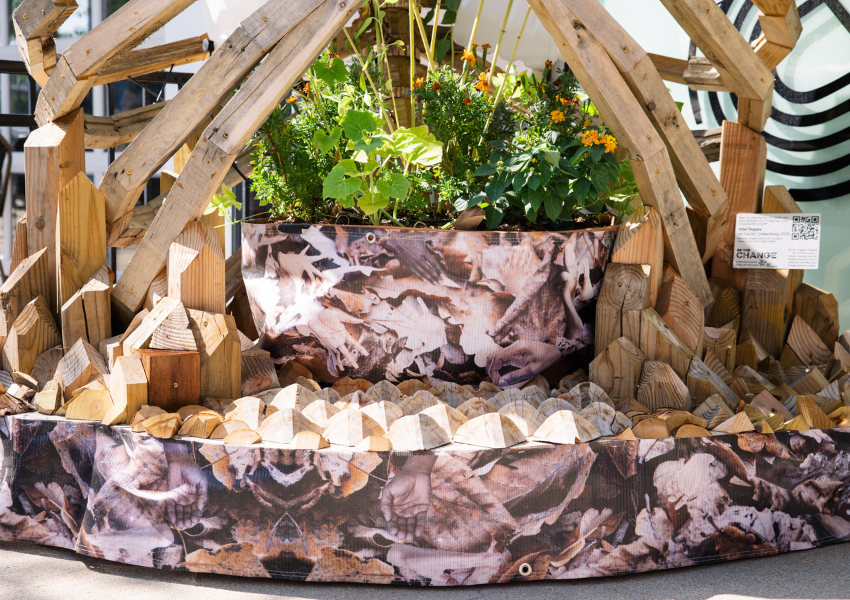
Above: A closer look at the base of Vital Organs.
Vital Organs
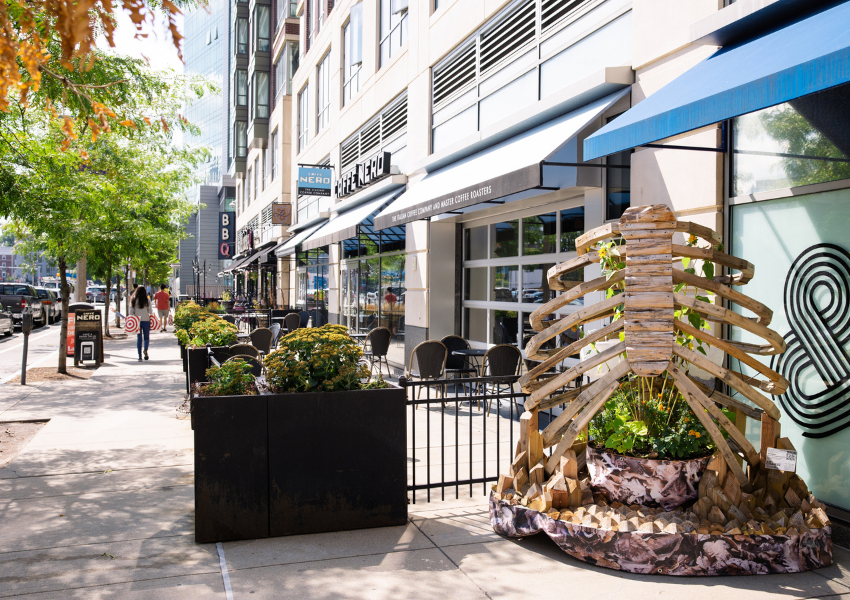
Above: Vital Organs publicly on view on the street in Boston.
Learn more about Be the Change and check out other work from Be the Change Boston 2022:
Our Family Tree – Jason Talbot
Healing Garden – Ngoc-Tran Vu
It’s Giving – Sam Mendoza Fraiman
Prisoner a-7713 – Caron Tabb
Zoongide’e – Nayana LaFond
JArts’ mission is to curate, celebrate, and build community around the diverse world of Jewish arts, culture, and creative expression. Our vision is of a more connected, engaged, and tolerant world inspired by Jewish arts and culture.
Reflections
The Torah commands us to try to create justice in the world. And climate justice is a big issue.
What does climate action have to do with justice?
Climate work and justice are deeply intertwined. The impact of the climate crisis rests disproportionately on those who have been historically marginalized: people living in poverty, in particularly vulnerable geographies, and people who experience racism and other kinds of bigotry such as Black, Brown, and Indigenous communities.
Across Boston, there's an average of 27% tree cover. However, some neighborhoods have under 10% canopy cover.
That disparity contributes to a 10-degree difference in day and nighttime temperatures and puts residents in hotspots at greater risk for heat related illnesses. A lack of trees also increases the risk of flooding, is linked to higher crime rates and worse
Urban trees are a critical asset to help cities be resilient in the face of climate change. What benefits do trees bring to your life?
Trees sequester carbon, reduce energy usage, remove air pollutants, filter stormwater, and cool hot city streets by providing shade and releasing water vapor.
Being around trees is good for mental health.
Having trees in your neighborhood can relieve stress, lower blood pressure, and can provide a sense of calm. This is especially important in the city where there are higher levels of stress-related health problems.
Boston Mayor Michelle Wu says the investment in more staff to care for the city’s 38,000 trees and plant more will focus on neighborhoods most in need.
How are voting and climate change intertwined? What initiatives in your community are making an environmental impact?
Want more?
Get curated JewishArts.org content in your inbox
